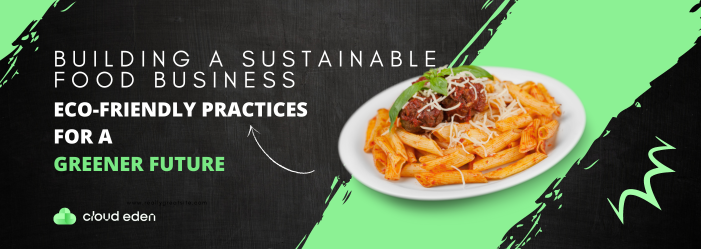Building a Sustainable Food Business

The food industry has a significant impact on the environment. From farm to table, there's a constant push for efficiency, but this often comes at the cost of sustainability. However, consumers are increasingly seeking out businesses that prioritize eco-friendly practices. So, how can you build a successful food business that's kind to the planet?
Why Sustainability Matters
Sustainability is all about meeting our current needs without compromising the ability of future generations to meet theirs. In the food industry, this means minimizing our environmental footprint. Here are some key reasons to prioritize sustainability:
- Reduces food waste: Every year, a third of all food produced globally goes to waste. This squanders resources and contributes to landfill gas emissions.
- Protects natural resources: Sustainable practices like water conservation and soil health preservation are crucial for maintaining a healthy planet.
- Promotes ethical sourcing: Supporting farms that use ethical practices, like humane animal treatment and avoiding harmful pesticides, benefits everyone.
- Boosts consumer confidence: People are drawn to businesses that align with their values. Sustainability can be a powerful differentiator in the marketplace.
Strategies for a Sustainable Food Business
Reducing Waste:
- Embrace imperfect produce: Partner with farmers to purchase "ugly" fruits and vegetables that would otherwise go to waste.
- Plan your portions: This reduces overproduction and spoilage in restaurants and catering businesses.
- Compost food scraps: Food scraps can be turned into nutrient-rich compost for gardens.
- Offer reusable options: Encourage customers to bring their own containers or use reusable packaging.
Sourcing Ethically:
- Local is best: Shorten your supply chain by sourcing ingredients from local farms. This reduces transportation emissions and supports your community.
- Look for certifications: Organic and Fair Trade certifications ensure ethical practices throughout the production process.
- Seasonal menus: Highlight seasonal ingredients at their peak freshness, reducing reliance on out-of-season produce.
- Minimise animal products: Consider plant-based options that have a lower environmental impact.
Implementing Eco-Friendly Practices:
- Reduce energy consumption: Invest in energy-efficient appliances and lighting.
- Water conservation: Implement water-saving measures like low-flow faucets and dishwashers.
- Sustainable packaging: Use recycled, compostable, or minimal packaging materials.
- Minimize transportation emissions: Explore alternative delivery methods like bicycles or electric vehicles for local deliveries.
Conclusion
Building a sustainable food business is an ongoing process.
By implementing these strategies, you can make a positive impact on the environment, resonate with eco-conscious consumers, and create a future-proof business model. Remember, every step, big or small, contributes to a greener plate and a healthier planet.
At Cloudeden, we specialize in helping Small businesses create winning content strategies. We offer a free consultation to help you set up your Food Business for Success.
Welcome To Our Blog





